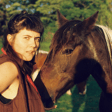
Loving What's Left with Tessa Campisi
Hello! I have been away in the bush for three days and three nights with just a tarp, sleeping bag and water to my name. No tent, no pillow, no torch, NO BREAKFAST. Off the back of this deeply moving ritual (which I'll tell you about soon), I wanted to release this equally as moving and foresty interview with Tessa Campisi.
Tessa is a writer, poet, audio visual artist, activist and radio host who speaks with the timbre of an old growth tree and tells stories that will rustle your leaves.
In this chat:
🌳 What it's like to live through a catastrophic flood
🌳 How anarchic networks can rise to meet a crisis, fast
🌳 What happens when forest conservationists are at loggerheads with traditional owners?
🌳 Strawman vs. steelman arguments
🌳 A new approach to deep listening to those you disagree with
🌳 What traditional activism gets wrong and how to be a more effective change agent
🌳 How and why to love the scraps of our beautiful, broken world
🧙♀️ LINKY POOS
Tessa's (online) exhibition ~ Framings of Wombat Forest
Article of interest ~ Reflections on forest gardening by Cam Walker https://www.melbournefoe.org.au/galk_galk_dhelkunya
Paper of interest ~ History of Environmentalist-Indigenous alliances and conflicts
Essay of interest ~ The Trouble with Wilderness by William Cronon
*** Become a Reskillience supporter on Patreon!***



















